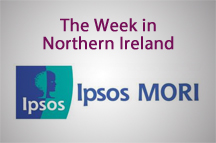 A Democratic deficit is any situation in which there is believed to be a lack of democratic accountability and control over the decision-making process. This definition arguably describes the current Northern Ireland political situation. With no Executive and Assembly there are no elected representatives making decisions on behalf of its citizens.
A Democratic deficit is any situation in which there is believed to be a lack of democratic accountability and control over the decision-making process. This definition arguably describes the current Northern Ireland political situation. With no Executive and Assembly there are no elected representatives making decisions on behalf of its citizens.
Three days ago, we passed the 300th day in Northern Ireland without a government and while senior civil servants represent us in Brexit negotiations and our budget is set by the Secretary of State our democratic deficit deepens and direct rule creeps ever closer.
On Monday, the Secretary of State brought the Northern Ireland Budget Bill before the House of Commons, it passed without a vote or much interest. The Budget initially appeared to contain some good news: The education budget is up by 1.5%, the health budget has increased by 5.4% but the justice budget and agriculture and environment budgets are down by 0.4% and 3% respectively. Hence, the overall day to day spending is up by 3.2% although given that inflation is now 3% it means there is no real increase.
The Secretary of State did regret that he had to bring the budget to Westminster and is hopeful that an Executive can still be formed and he also informed the House that £50m from the confidence and supply deal between the Conservatives and the DUP will be released in this financial year. However, a budget is now in place but what did the local parties have to say about that?
 The democratic deficit was articulated by SDLP leader Colum Eastwood when he stated that Monday was “a ‘significant day’ with ‘decisions being taken in London which should have been taken in Belfast’”. That is Northern Ireland has no control over its own finances and is not making its own decisions. The Alliance leader warned that the money is not going to where it is needed but rather to areas which were decided on in the last Executive and is ignoring current need by using out of date decisions. Who will be held accountable if money is wasted? The UUP are even more fearful for the future of Northern Ireland with Steve Aiken sounding the warning bell that Northern Ireland must have ministers in place by January to make policy decisions that will shape the 2018-19 budget for everybody in Northern Ireland. Otherwise he fears “that we're in real danger." Meanwhile Sinn Fein and the DUP continue to blame each other for the failure to have a working devolved Government.
The democratic deficit was articulated by SDLP leader Colum Eastwood when he stated that Monday was “a ‘significant day’ with ‘decisions being taken in London which should have been taken in Belfast’”. That is Northern Ireland has no control over its own finances and is not making its own decisions. The Alliance leader warned that the money is not going to where it is needed but rather to areas which were decided on in the last Executive and is ignoring current need by using out of date decisions. Who will be held accountable if money is wasted? The UUP are even more fearful for the future of Northern Ireland with Steve Aiken sounding the warning bell that Northern Ireland must have ministers in place by January to make policy decisions that will shape the 2018-19 budget for everybody in Northern Ireland. Otherwise he fears “that we're in real danger." Meanwhile Sinn Fein and the DUP continue to blame each other for the failure to have a working devolved Government.
Lord Empey cautioned that if devolution disappeared it would be a long time before it returned. There have been some suggestions that the two governments need to intervene via more than a phone call to reignite negotiations.
However, the democratic deficit was best described by Peter Hain in the Guardian. He commented that there is no sense of crisis among the Northern Ireland citizens rather more worryingly there is “a sense of weary cynicism and resigned hopelessness that the political class has failed them yet again”. Moreover, he believes that “the legislative assembly seem oblivious to the corrosive effect on the democratic process.” As the Guardian points out “Paralysis has gripped Northern Ireland. But politicians are just looking blithely on”.












